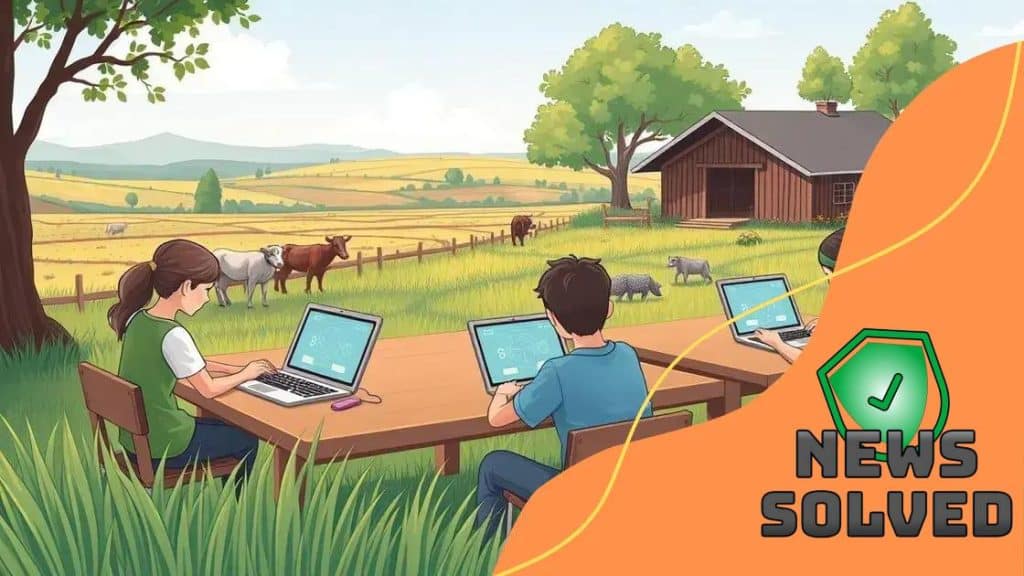How virtual learning is enhancing access to education in rural areas

Advertisements
Virtual learning is enhancing access to education in rural areas by providing flexible, accessible options that enable students to engage with diverse courses and resources, overcoming traditional barriers.
How virtual learning is enhancing access to education in rural areas is transforming the landscape of learning. Have you noticed how more students are benefiting from online resources? Let’s dive into this shift.
Advertisements
The rise of virtual learning platforms
The rise of virtual learning platforms has changed the education landscape significantly. More students, especially in rural areas, explore this modern mode of learning. These platforms make education accessible, flexible, and engaging.
Benefits of Virtual Learning
Many students now benefit from unique opportunities through virtual learning. They can learn at their own pace, which is crucial for understanding complex subjects. Additionally, online resources often include multimedia tools that enhance learning.
- Increased accessibility to diverse courses
- Flexibility in learning schedules
- Engagement through interactive content
- Support from online communities
As technology advances, more innovative virtual learning platforms emerge. For example, students can now participate in virtual classrooms that simulate real-life interactions with teachers and peers. This interaction is essential as it fosters collaboration and builds social skills.
Advertisements
Challenges of Virtual Learning
Despite its benefits, virtual learning presents challenges, especially for students in remote areas. Access to reliable internet is often an obstacle. Without stable connections, engaging in online classes becomes difficult.
However, many communities are working to address these issues. Local organizations and schools are advocating for better infrastructure, ensuring that every student benefits from virtual education. By tackling these challenges, they pave the way for more learners to thrive.
Challenges faced by rural students
Rural students face a unique set of challenges that can hinder their educational progress. One major issue is the lack of access to reliable internet. Without a strong connection, attending virtual classes and engaging with learning materials online becomes nearly impossible. This not only affects their ability to learn but also their chances of succeeding academically.
Limited Resources
Many rural areas lack the educational resources found in urban schools. Schools may not have the latest technology or enough computers for each student. This gap in resources can create a significant disadvantage for students.
- Fewer access points for internet connectivity
- Limited availability of educational materials
- Inadequate support from teachers due to high student-to-teacher ratios
Additionally, students often have fewer opportunities for extracurricular activities that enhance their learning experience. While schools in urban areas might offer diverse programs and clubs, rural institutions may struggle to provide similar options due to budget constraints.
Transportation Issues
Transportation can also be a big hurdle. Many rural students live far from school and rely on the school bus, which may not always run on a consistent schedule. If a bus is late or does not come at all, students can miss valuable learning time.
Another challenge is the cultural stigma surrounding online education. Some families may not understand how virtual learning works, leading to resistance against embracing these new methods. This can limit students’ options and reduce their exposure to effective educational opportunities.
Benefits of online education in remote areas

Online education brings numerous benefits to students in remote areas. It breaks down barriers that traditional education systems often impose. With the rise of virtual learning, students who once faced geographical challenges can now access a wide range of educational resources.
Flexibility in Learning
One major advantage is the flexibility online education offers. Students can learn at their own pace and on their own schedule. This is especially helpful for those who have to balance school with other responsibilities. For example, a student may work on their lessons in the evening after helping their family during the day, allowing for a personalized learning experience.
- Ability to access courses anytime, anywhere
- Opportunity to revisit materials as needed
- Customizable learning environments
Another benefit of online education is the access to diverse course options. In remote areas, students might not have many subjects available at their local schools. However, with online platforms, they can explore subjects ranging from advanced mathematics to foreign languages. This exposure to different topics can spark interests and passions that might not have been discovered otherwise.
Building a Community
Online education also fosters a sense of community among students. Even if they are physically distant, they can connect with peers and instructors through discussion boards and virtual classrooms. This interaction helps them feel less isolated and more a part of the learning process.
Additionally, online platforms often provide career resources and mentorship opportunities that can be incredibly valuable for students in remote areas. Access to workshops, webinars, and networking events can enhance their skills for future job prospects. By leveraging online education, students gain not just academic knowledge but also practical skills necessary for their careers.
Success stories of virtual learning
Success stories of virtual learning highlight the positive impact this method has on students, especially in remote areas. Many individuals have found new opportunities and achieved their educational goals through online platforms. These real-life examples demonstrate how technology can transform education.
Student Achievements
One inspiring example is a young student from a rural community who struggled to find advanced classes locally. Once they discovered virtual learning, access to a wide range of subjects opened doors. This student gained skills in coding and graphic design, ultimately leading to internship opportunities with tech companies.
- Increased access to advanced courses
- Skill development in new subjects
- Connection with mentors in different fields
Another success story comes from a group of students in a rural area who formed an online study group. They used video conferencing to help each other with challenging subjects. This collaboration not only improved their grades but also built a sense of community among them.
Educational Accessibility
Moreover, many adult learners have achieved their educational aspirations through virtual learning. They can continue their studies while managing jobs and family responsibilities. For instance, a single mother was able to complete her high school diploma online while caring for her children. By providing a flexible learning environment, online education allows more people to advance their skills and careers.
These stories prove that the impact of online education is profound. As more individuals take advantage of these opportunities, the future of learning looks brighter. This method not only enhances academic knowledge but also fosters personal growth and resilience.
Future of education technology in rural settings
The future of education technology in rural settings is bright and full of potential. As advancements in technology continue, they promise to enhance accessibility and improve learning outcomes for students in these areas. With innovations like high-speed internet initiatives and advanced learning platforms, rural students are beginning to see more opportunities than ever.
Adoption of Advanced Technologies
One key factor in shaping the future of education in rural areas is the adoption of advanced technologies. Schools are increasingly using tools like artificial intelligence and virtual reality to create immersive learning experiences. These technologies allow students to engage with material in ways that were previously unimaginable.
- Personalized learning through data analytics
- Interactive simulations for complex subjects
- Access to a global range of resources
Moreover, many educational institutions are partnering with tech companies to develop tailored solutions that meet the specific needs of rural students. These collaborations can lead to innovative platforms that provide quality education where it is most needed.
Expansion of Internet Access
The expansion of internet access is also crucial for the future of education technology. Governments and organizations are investing in infrastructure to provide reliable connectivity in remote areas. This will enable students to access online resources and participate in virtual classes, making education more equitable.
As these developments unfold, rural students will gain the ability to connect with teachers, mentors, and peers from around the world. This connectivity fosters collaboration and broadens their perspectives, preparing them for a globalized workforce.
The integration of technology in education also encourages lifelong learning. As educational resources become more accessible and diverse, individuals of all ages will seek out opportunities to enhance their skills and knowledge, benefitting both their communities and their personal growth.
FAQ – Frequently Asked Questions about Virtual Learning in Rural Areas
What are the main benefits of virtual learning for rural students?
Virtual learning provides accessibility, flexibility, and a wider range of courses, helping rural students to achieve their educational goals.
How does technology improve education in remote areas?
Advancements like high-speed internet and online platforms allow for interactive and engaging learning experiences that were previously unavailable.
What challenges do rural students face in online education?
Rural students often struggle with limited internet access, fewer resources, and transportation issues that can impact their learning.
Can online education help adult learners in rural areas?
Yes, online education offers adult learners the flexibility to continue their studies while managing work and family responsibilities.





